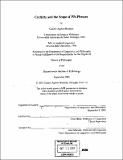| dc.contributor.advisor | Irene Heim. | en_US |
| dc.contributor.author | Aguero Bautista, Calixto | en_US |
| dc.contributor.other | Massachusetts Institute of Technology. Dept. of Linguistics and Philosophy. | en_US |
| dc.date.accessioned | 2009-01-23T15:10:29Z | |
| dc.date.available | 2009-01-23T15:10:29Z | |
| dc.date.copyright | 2001 | en_US |
| dc.date.issued | 2001 | en_US |
| dc.identifier.uri | http://dspace.mit.edu/handle/1721.1/8200 | en_US |
| dc.identifier.uri | http://hdl.handle.net/1721.1/8200 | |
| dc.description | Thesis (Ph. D.)--Massachusetts Institute of Technology, Dept. of Linguistics and Philosophy, 2001. | en_US |
| dc.description | Includes bibliographical references (leaves 214-221). | en_US |
| dc.description.abstract | This thesis argues that in a constituent question with a universal quantifier, syntactic reconstruction of the wh-phrase below the quantifier is the source of scope ambiguities. In particular, I argue, based on the interaction of PL-readings with binding conditions A and B, that syntactic reconstruction of the wh-phrase below the quantifier is necessary for the PL-readings or family-of-questions interpretation to be available. The thesis takes as a starting point the assumption, fundamental to the approaches of May (1985), Aoun and Li (1993), and Chierchia (1993), that wh-quantifier interaction is subject to a nesting-crossing asymmetry. Two things are shown in the first two chapters: 1) that the subject-object asymmetry is a relative phenomenon depending on the type of the quantifier used (whether one uses each vs every), and the type of the wh-phrase extracted (e.g. a which-phrase vs. a how many-phrase,) and 2), questions with quantifiers exemplifying nesting configurations are in fact unambiguous when reconstruction of the wh-phrase is blocked by binding theoretic principles. The data show that nesting is insufficient, whereas reconstruction is necessary condition for the availability of PL-readings. The proper treatment of wh-quantifier interaction is therefore one that treats the phenomenon in terms of reconstruction. | en_US |
| dc.description.abstract | (cont.) The second part of the thesis argues that reconstruction is necessary for PL-readings, because such interpretations are a particular case of variable binding in which the universal quantifier binds an implicit variable in one of the copies of the wh-phrase, which is analyzed as a skolemized choice function as in Kratzer's (1998) theory of indefinites. It is argued on the basis of empirical considerations that WCO is irrelevant contra Chierchia (1993) because WCO is irrelevant for implicit variables. The third part of the dissertation shows that the reconstruction view of PL-readings opens up the possibility to use such interpretations as a diagnostic for successive cyclicity. This possibility is exploited with a certain degree of success. By comparing the interaction of overtly displaced wh-phrases with quantifiers, on the one hand, and the interaction of wh in situ and universal quantifiers, on the other, it is concluded that whereas overtly moved wh-phrases move in successive cyclic fashion, wh-phrases in situ do not get their scope via successive cyclic movement. | en_US |
| dc.description.statementofresponsibility | by Calixto Agüero-Bautista. | en_US |
| dc.format.extent | 221 leaves | en_US |
| dc.language.iso | eng | en_US |
| dc.publisher | Massachusetts Institute of Technology | en_US |
| dc.rights | M.I.T. theses are protected by
copyright. They may be viewed from this source for any purpose, but
reproduction or distribution in any format is prohibited without written
permission. See provided URL for inquiries about permission. | en_US |
| dc.rights.uri | http://dspace.mit.edu/handle/1721.1/8200 | en_US |
| dc.rights.uri | http://dspace.mit.edu/handle/1721.1/7582 | en_US |
| dc.subject | Linguistics and Philosophy. | en_US |
| dc.title | Cyclicity and the scope of wh-phrases | en_US |
| dc.type | Thesis | en_US |
| dc.description.degree | Ph.D. | en_US |
| dc.contributor.department | Massachusetts Institute of Technology. Department of Linguistics and Philosophy | |
| dc.identifier.oclc | 50104542 | en_US |
